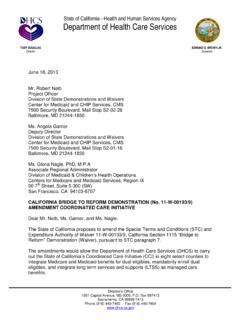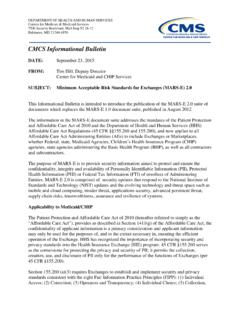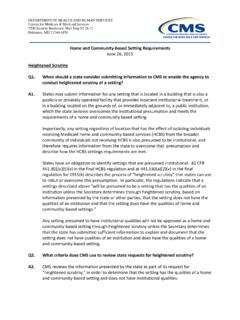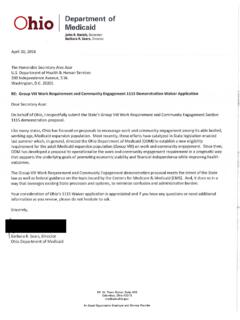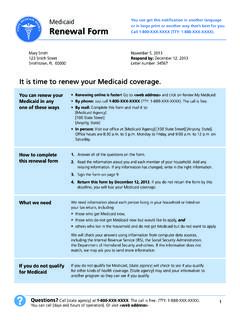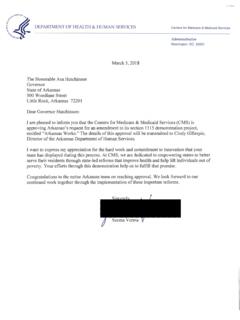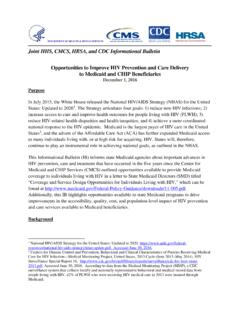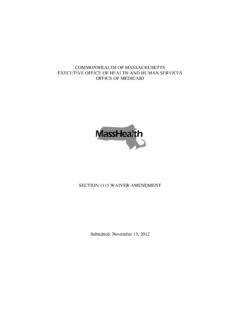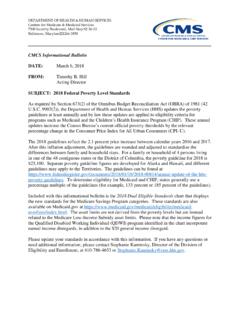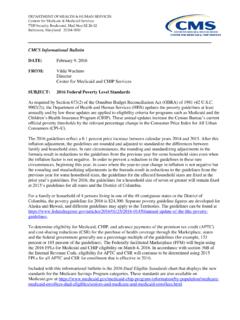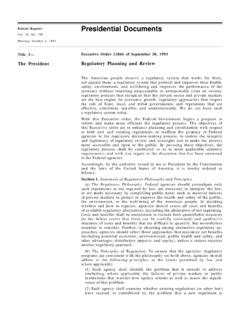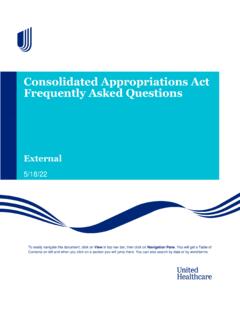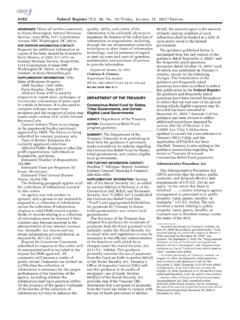Transcription of Eligibility and Enrollment Final Rule - Medicaid
1 Eligibility and Enrollment Final Rule Medicaid and CHIP. Center for Medicaid and CHIP Services December 1, 2016. Eligibility & Appeals Final Rule CMS-2334-F2. Medicaid and Children's Health Insurance Programs: Eligibility Notices, Fair Hearing and Appeal Processes for Medicaid and Other Provisions Related to Eligibility and Enrollment for Medicaid and CHIP;. Final Rule On display at the Federal Register November 21, 2016. Published November 30, 2016. Finalizes a subset of provisions included in the notice of proposed rulemaking (78 FR 4594) issued on January 22, 2013. Key Provisions Notices Appeals Medicaid Eligibility Changes under the Affordable Care Act & Other Statutes Accessibility for Individuals who are Limited English Proficient Verification Financial Methodologies Medical Support and Payment CHIP-specific Provisions Electronic Submission of Medicaid and CHIP State Plans Notices Content of Eligibility Notices Establishes minimum standards for content of Eligibility notices ( (a)).
2 Approval notices must include ( (b)): Basis and effective date of Eligibility Benefits and services available Premium and cost sharing obligations Procedures for reporting changes Appeal rights Non-MAGI Eligibility ( (c)). Denial/termination notices must include clear explanation of reason for ineligibility Coordination with Other Programs ( (d), (h)). Phases in use of single Eligibility notices for multiple programs Combined Eligibility notice to be provided by the last entity to touch an application or renewal Requires coordinated content for individuals who will not receive a combined notice Combined Eligibility notice ( (h)). Requires use of combined Eligibility notices to the extent feasible, taking into account: Whether state uses a shared Eligibility service with the Marketplace Whether FFM is determining or assessing Eligibility for Medicaid and CHIP. Maturity of the Eligibility and Enrollment systems operated by the state Time Coordinated Content ( (h)).
3 Includes, if applicable (h)(2-3): Status of individual's Eligibility determination for other program Impact of Eligibility for/ Enrollment in one program on Eligibility for another program Status of other household members Appeals Coordination with Other Programs ( (g)). If an Exchange or other insurance affordability program provides an individual with a combined Eligibility notice including determination of Medicaid /CHIP ineligibility, the Exchange or other program/appeals entity will: Provide individual with an opportunity to submit a joint fair hearing request . Notify the Medicaid /CHIP agency of any joint fair hearing request to be conducted by agency, and transmit the individual's electronic account to the agency Coordination Agreements ( (b)). Requires Medicaid and CHIP agencies to enter into agreements with the Exchange/appeals entity and other programs/appeals entity to: Minimize burden on individuals seeking to appeal a denial or determination related to one or more program Provide for a combined appeals decision in appropriate situations Transfer of Information ( (g)).
4 Directs Medicaid and CHIP agencies to establish a secure electronic interface through which, when appropriate . The Exchange or other program or appeals entity can notify the agency that an individual has submitted a joint fair hearing request The individual's electronic account can be transferred from one program to the other The agency can notify the Exchange or other program or appeals entity that an individual has appealed a Medicaid denial; whether Medicaid benefits will be furnished pending a decision; and the outcome of the appeal Expedited Fair Hearings ( , (f)). Requires states to establish and maintain an expedited fair hearing process ( ). Establishes a standard for expedited fair hearings: If the agency determines that the standard timeframe permitted for a fair hearing could jeopardize the individual's life, health or ability to attain, maintain, or regain maximum function ( ).
5 Creates a timeframe for Final action: 7 days for Eligibility -related matters ( , (f)). 3 days for benefit or services related matters ( , (f)). Fair Hearing Request ( , ). Makes fair hearing requests and expedited hearing requests available through all modalities ( ). Requires states to accept any method for withdrawal of a fair hearing request ( ). Clarifies circumstances when an applicant or beneficiary can request a fair hearing ( ). Provides for a fair hearing system that is accessible to individuals who are limited English proficient and individuals with disabilities and that complies with anti-discrimination statutes and regulations ( ). Medicaid Eligibility Changes under the Affordable Care Act & Other Statutes Medicaid Eligibility Changes cont'd Codifies statutorily-established Eligibility groups: Former foster care children (42 CFR ). Continuous Eligibility for hospitalized children (42 CFR ).
6 Continuous Eligibility for children up to age 19 (42 CFR ). Optional Eligibility : Individuals needing treatment for breast or cervical cancer (42 CFR. ). Individuals needing family planning-limited coverage (42 CFR and ). Individuals with tuberculosis (42 CFR ). Independent foster care adolescents (42 CFR ). Presumptive Eligibility (42 CFR 435, 1001-1002 and ). Medicaid Eligibility Changes cont'd Streamlines and updates Eligibility groups: Deemed newborn children (42 CFR ). CHIPRA changes for pregnant women receiving emergency Medicaid , CHIP. Families with Eligibility extended due to increased spousal support collection (42. CFR ). Children with title IV-E adoption assistance, foster care, or guardianship care (42. CFR ). Optional Eligibility for: Parents and other caretaker relatives (42 CFR ). Reasonable classifications of individuals under age 21 (42 CFR ). Individuals under age 21 with state adoption assistance agreements (42 CFR.)
7 Targeted low-income children (42 CFR ). Medically need parents and other caretaker relatives (42 CFR ). Former Foster Care Children 42 CFR Mandatory coverage for individuals under age 26 who were: 1. In foster care under the responsibility of the state or Tribe upon attaining either age 18 or a higher age at which foster care ends, and 2. Enrolled in Medicaid under the state's Medicaid state plan or section 1115 demonstration at that point in time Former Foster Care Children Changes from the NPRM. Proposed option to cover individuals who were in foster care and enrolled in Medicaid in any state not finalized Final rule provides state option to cover individuals who were in foster care upon attaining age 18 or a higher age at which foster care ends and enrolled in Medicaid at some point during the period of foster care during which the individual aged out Verification Process Verification Verification of citizenship and non-citizen status (42 CFR , , , , ).
8 Special circumstances (42 CFR. (c)(3)). Verification of Citizenship & Non-Citizen Status (42 CFR , , , , ). Primacy of electronic verification through FDSH or alternative approved mechanism ( (a)(1)(i)(A) and (a)(2)(i)). CHIPRA changes to citizenship documentation requirement Exemption of deemed newborns, documentation issued by a Federally Recognized Indian Tribe ( (a)(1)(iii)(E), (a)(5)). Application to CHIP ( (d), (b)). Reasonable Opportunity Period (42 CFR (a)(5) and (b), (b)). 90 days for citizenship and non-citizen status Benefits provided during ROP to same extent as otherwise-eligible individuals based on attested status Simplifies the paper documentation process if needed, for example ( ). Original documents not required ( (f)). Eliminates hierarchy of preferred documentation State option to use verification by another state or federal agency in certain circumstances ( (d)).
9 Good faith extension for non-citizens only ( (b)(2)(ii)(B)). Financial Methodologies Application of Financial Eligibility Methodologies ( and 602). Clarifies that the methodologies set forth in and apply only to individuals excepted from MAGI. SSI methodologies apply to Eligibility based on being over age 64, or having a disability or blindness Limits on attributing, or deeming, the income and resources from other individuals to an applicant or beneficiary MAGI-like methods for certain medically needy individuals ( ). Permits application of AFDC-based methods or a MAGI-like methodology to determine income Eligibility for medically needy children, pregnant woman, parents and other caretaker relatives Methodology adopted cannot violate limitations on deeming or attribution of income from other individuals MAGI-based Methodologies ( ). Clarifies that exception from MAGI-based methodologies for individuals needing long-term services and supports (LTSS) applies when Being institutionalized or receiving LTSS is a condition of Eligibility ; or The Eligibility determination is being made for the purpose of receiving LTSS.
10 Individuals eligible under a MAGI-based group are not excepted from the MAGI-based methodologies simply because they require LTSS. State flexibility for optional family planning group Other Provisions Medical Support & Payments At application, requires that individualsagree to cooperate with child support enforcement Enforcement of requirement to cooperate in pursuing medical child post- Enrollment Supports alignment and coordination with other insurance affordability programs 42 CFR , , , , , and Accessibility for Individuals who are Limited English Proficient ( ). Language services for limited English proficient individuals to include oral interpretation and written translation ( (b)(1)). Requires taglines indicating availability of language services. ( (b)(3)). CHIP. Many of the Medicaid provisions apply fully or with moderate variation to CHIP: Notices Coordination involving appeals entities Deemed newborns Family planning Continuous Eligibility Presumptive Eligibility Verification Language accessibility Electronic state plan submission Electronic Submission of Medicaid & CHIP State Plans ( ).
